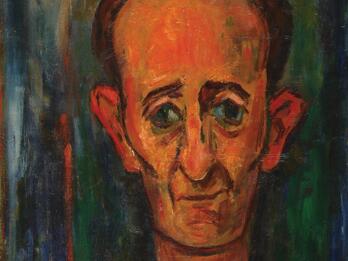Holocaust and Post-Holocaust Life-Writing and Reportage
Life writing and reportage captured individual Jewish experiences in a period of conflict and uncertainty.
In a period of destruction and rebirth, and of the forced uprooting of entire Jewish communities, it was life writing and reportage that conveyed both the immediacy of individual experience and the myriad ways that Jews as individuals understood and acted out their Jewish identity, remembered their own Jewish stories, and embraced or rejected their Jewishness. It was during the period of 1939–1973, therefore, that this genre became especially salient. Life writing and reportage did not have to be consistent or coherent. It could be fragmented, contradictory, inchoate, privileging subjective feelings. The very language in which it was written—Yiddish, Hebrew, French, Arabic—often signaled how the authors defined themselves and the kind of audience they hoped to reach. Life writing appeared in different forms, such as diaries that recorded feelings in real time or memoirs that ordered lived experience through retrospective narrative. And life writing, more than any other genre, highlights one of the most important themes of the modern Jewish experience: the memory of place and the bonds of family. In life writing, uprooted and scattered Jews recall their roots and take refuge in family ties that often spanned many continents.
As a genre, life writing is especially important in times and places marked by danger and uncertainty, such as Nazi-occupied Europe or in an Israel facing constant conflict. Behind the Iron Curtain, Jewish writers found fewer barriers to publication when they wrote in this genre, and they seized opportunities to insert themes that eluded the censor’s attention. Reportage, a genre connected to the rise of the mass press, was especially important in the ghettos and in Israel, as it explained, decoded, and described the microcosms of communities experiencing massive displacement and disorientation.
Life writing and reportage conveys a whole gamut of emotions and experience, taking the reader into the ghettos of Eastern Europe, into solitary hiding places, and even into the gas chambers of Birkenau. Holocaust survivors like Primo Levi and Elie Wiesel wrote memoirs that a generation later would make Auschwitz the major symbol of the Holocaust. Jews uprooted from Arab lands described their ironic sense of displacement in a Jewish state. Native-born Israelis disclosed their ambivalent feelings toward Holocaust survivors. Young Israeli soldiers, raised in the secular leftist ideals of the kibbutzim of the 1940s and 1950s, reflected on their never-ending war with the Arabs and their conflicted feelings about uprooted Palestinians. The children of Yiddish-speaking immigrants to the United States and Britain narrated their journey from ethnic slums to literary fame.


